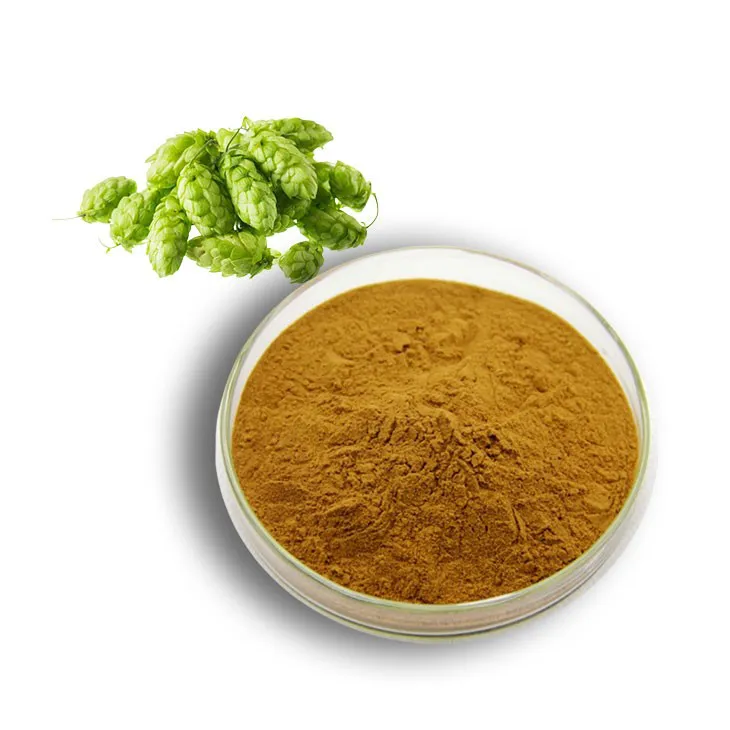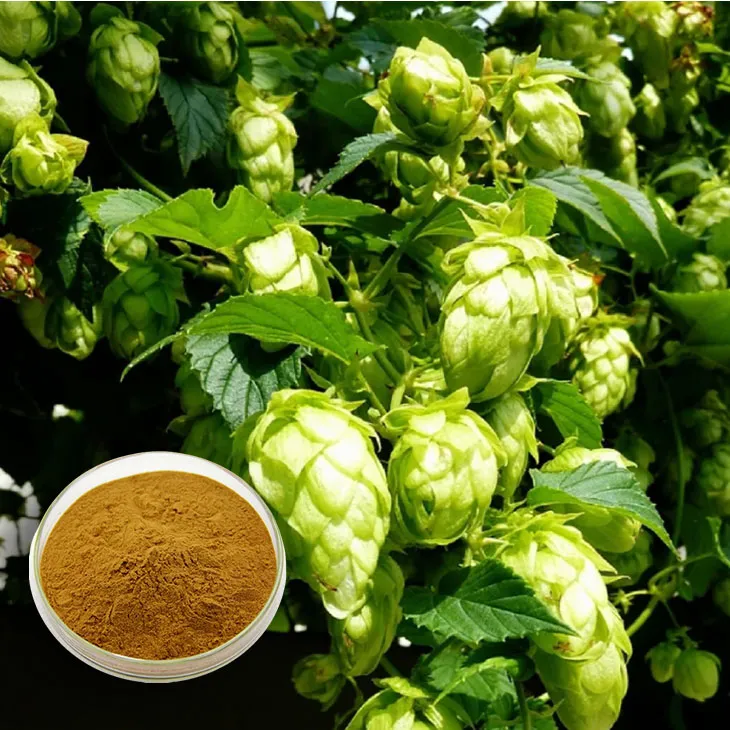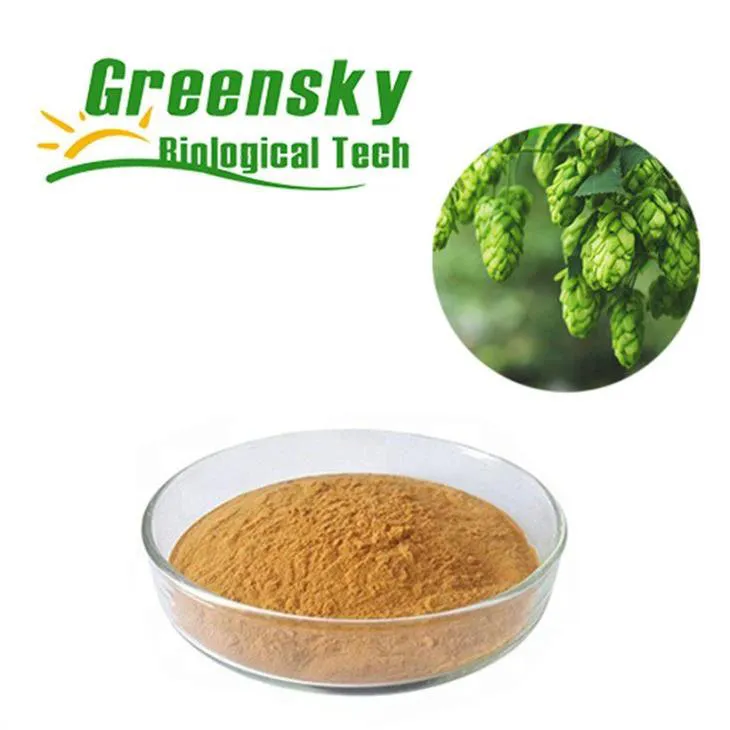- 0086-571-85302990
- sales@greenskybio.com
Manufacturers of hops extracts.
2024-11-26

1. Introduction to Hops Extract Manufacturers
Beer hop extract manufacturers play a crucial role in both the beverage and flavor industries. Hops, as an essential ingredient in beer, are transformed into a more convenient and multi - functional form through the extraction process. These manufacturers are not just simple producers; they are experts with in - depth knowledge of hop botany and chemistry.

2. Knowledge of Hop Botany and Chemistry
2.1 Understanding Hop Cultivars
Manufacturers have to be well - versed in different hop cultivars. Each cultivar has its own unique characteristics, such as flavor profiles, bitterness levels, and aroma intensities. For example, the Cascade hop is known for its citrusy and floral aroma, while the Fuggle hop has a more earthy and spicy character. They know which cultivars are more suitable for certain types of beer styles. For instance, IPAs (India Pale Ales) often benefit from using hops with strong citrus and piney aromas like Amarillo or Simcoe hops.2.2 Chemical Composition of Hops
Understanding the chemical composition of hops is also vital. Hops contain alpha - acids, beta - acids, essential oils, and polyphenols. Alpha - acids are responsible for the bitterness in beer during the brewing process. The manufacturers need to know how to optimize the extraction of these components. They also need to consider the stability of these compounds during extraction and storage. For example, beta - acids can be oxidized during the extraction process, which may affect the final quality of the extract.
3. The Extraction Process
3.1 A Blend of Science and Art
The extraction process of hops is truly a blend of science and art. It requires precise control of various parameters. Temperature is one of the key factors. Different temperatures can lead to different extraction efficiencies and qualities. For example, if the temperature is too high, it may cause the degradation of some of the delicate flavor - contributing compounds in hops. Pressure also plays a role. Controlled pressure can help in better solvent penetration into the hop material, ensuring a more complete extraction.3.2 Solvent Usage
The choice of solvent is crucial in the extraction process. Common solvents used include ethanol and carbon dioxide. Ethanol - based extractions can be effective in extracting a wide range of compounds from hops, but it requires careful handling due to its flammability. Carbon dioxide extraction, on the other hand, is a more "clean" method as it leaves no solvent residues in the final product. However, it requires specialized equipment and precise control of pressure and temperature conditions.3.3 Quality Control in Extraction
Manufacturers need to ensure the consistency of the extract quality. This involves regular testing of the extracts. For example, they may use chromatography techniques to analyze the composition of the extracts. They also need to monitor the physical properties such as color, clarity, and viscosity of the extracts. Any deviation from the standard quality parameters may indicate a problem in the extraction process.
4. Contribution to Beer Industry Innovation
4.1 Customization for Breweries
Beer hop extract manufacturers contribute significantly to the innovation in the beer industry through customization. They can provide extracts tailored to the specific needs of different breweries. Some breweries may be aiming for a highly bitter beer, in which case the manufacturers can supply extracts with a high concentration of alpha - acids. Others may be more interested in creating a beer with a complex and unique aroma. For such breweries, the manufacturers can offer extracts rich in specific essential oils that contribute to the desired aroma, such as the myrcene - rich extracts for a more fruity aroma.4.2 Facilitating New Beer Styles
By providing a diverse range of extract options, these manufacturers enable brewers to experiment and create new beer styles. For example, the rise of hazy IPAs can be partly attributed to the availability of new hop extracts that can impart unique flavors and aromas while still maintaining the hazy appearance. Brewers can combine different extracts to create beers with previously unachievable flavor profiles, such as a beer with a combination of tropical fruit aromas and a balanced bitterness.5. International Trade and Export
5.1 Global Reach5.2 Complying with International Regulations
In international trade, these manufacturers have to comply with international regulations regarding food safety and quality. This includes regulations on pesticide residues, heavy metal content, and microbiological safety. For example, the European Union has strict regulations on the maximum allowable levels of pesticides in food products, and hop extract manufacturers exporting to the EU need to ensure that their products meet these standards. This compliance further emphasizes their commitment to high - standard production.6. Challenges Faced by Hops Extract Manufacturers
6.1 Raw Material Variability
One of the major challenges faced by hop extract manufacturers is the variability of raw materials. Hops can vary in quality and composition depending on factors such as the growing season, climate, and soil conditions. For example, a drought - stricken growing season may result in hops with lower alpha - acid content. Manufacturers need to develop strategies to deal with this variability, such as blending hops from different sources or adjusting their extraction processes accordingly.6.2 Competition in the Market
The market for hop extracts is becoming increasingly competitive. There are more and more manufacturers entering the market, both locally and internationally. This competition not only comes from traditional hop - growing regions but also from new players in emerging economies. Manufacturers need to constantly innovate and improve their products and services to stay competitive. For example, they may invest in research and development to find new extraction methods or develop new hop cultivars specifically for extract production.6.3 Changing Consumer Preferences
Consumer preferences in the beer market are constantly changing. There is an increasing demand for low - alcohol or non - alcoholic beers, as well as beers with unique and natural flavors. Hop extract manufacturers need to adapt to these changing preferences. For example, they may need to develop extracts that can provide the desired flavor and aroma in low - alcohol beers without adding excessive bitterness.7. Future Outlook for Hops Extract Manufacturers
7.1 Technological Advancements
Looking ahead, technological advancements are likely to play a significant role in the future of hop extract manufacturers. New extraction technologies may be developed that are more efficient, environmentally friendly, and cost - effective. For example, the development of supercritical fluid extraction using alternative solvents may offer new opportunities for hop extract production. Additionally, advances in analytical techniques will enable manufacturers to better understand and control the quality of their extracts.7.2 Sustainability Initiatives
Sustainability is becoming an increasingly important aspect in the industry. Hops extract manufacturers may need to focus on sustainable sourcing of hops, reducing waste in the extraction process, and minimizing their environmental impact. For example, they may work with hop growers to promote organic farming practices or invest in energy - efficient extraction equipment.7.3 Collaboration in the Industry
There is likely to be more collaboration within the industry in the future. Manufacturers may collaborate with breweries, hop growers, and research institutions. For example, joint research projects between manufacturers and breweries can lead to the development of new beer products and the optimization of extraction processes. Collaboration with hop growers can ensure a stable supply of high - quality raw materials.FAQ:
What are the key factors in the extraction process of hop extracts?
The extraction process of hop extracts is a blend of science and art. Key factors include precise control of parameters such as temperature, pressure, and solvent usage. These factors are crucial for producing extracts with consistent quality.
How do beer hop extract manufacturers contribute to the beer industry?
Beer hop extract manufacturers contribute to the beer industry in multiple ways. They have in - depth knowledge of hop botany and chemistry, enabling them to obtain high - quality extracts from different hop cultivars. Their products can be customized to meet the specific requirements of different breweries, allowing brewers to experiment and create new beer styles.
What role do beer hop extract manufacturers play in international trade?
Beer hop extract manufacturers are important exporters in international trade. Their products are shipped around the world, bringing the unique flavors of different hop varieties to breweries globally. They also need to comply with international regulations regarding food safety and quality to ensure high - standard production.
How do manufacturers ensure the quality of hop extracts?
Manufacturers ensure the quality of hop extracts by having a deep understanding of hop botany and chemistry. They carefully handle different hop cultivars and precisely control the extraction process parameters such as temperature, pressure, and solvent usage. Also, compliance with international food safety and quality regulations helps in maintaining high - quality standards.
Why is the customization of hop extracts important for breweries?
The customization of hop extracts is important for breweries because different breweries have different preferences. Some may prefer a more bitter extract, while others may focus on aroma - rich extracts. Customized extracts enable breweries to create unique beer flavors and styles according to their own concepts.
Related literature
- The Chemistry and Technology of Hop Extracts in Brewing"
- "Hop Extract Manufacturing: Best Practices and Innovations"
- "The Role of Hop Extracts in the Global Beer Market"
- ▶ Hesperidin
- ▶ citrus bioflavonoids
- ▶ plant extract
- ▶ lycopene
- ▶ Diosmin
- ▶ Grape seed extract
- ▶ Sea buckthorn Juice Powder
- ▶ Beetroot powder
- ▶ Hops Extract
- ▶ Artichoke Extract
- ▶ Reishi mushroom extract
- ▶ Astaxanthin
- ▶ Green Tea Extract
- ▶ Curcumin Extract
- ▶ Horse Chestnut Extract
- ▶ Other Problems
- ▶ Boswellia Serrata Extract
- ▶ Resveratrol Extract
- ▶ Marigold Extract
- ▶ Grape Leaf Extract
- ▶ blog3
- ▶ blog4
-
Chinese Withania somnifera Extract Factory.
2024-11-26
-
中国松树皮提取物粉粉末供应商
2024-11-26
-
High - quality Marigold Extract Products.
2024-11-26
-
100% Pure Natural Mango - Flavored Powder.
2024-11-26
-
Pine bark Extract Powder
2024-11-26
-
Eyebright Extract
2024-11-26
-
Pueraria Lobata Extract
2024-11-26
-
Peppermint Oil
2024-11-26
-
Acerola Juice Powder
2024-11-26
-
Red Date Extract
2024-11-26
-
Hericium erinaceus extract powder
2024-11-26
-
Saffron Extract Powder
2024-11-26
-
Lavender Extract
2024-11-26
-
Europen Bilberry Extract
2024-11-26





















